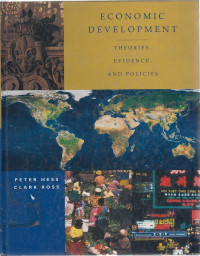
Text
Economic Development: Theories, Evidence, and Policies
In 1920 the great economist, Alfred Marshall, wrote in the eighth edition of his Principles of Economics, "The study of the causes of poverty is the study of the causes of the degradation of a large part of mankind." His characterization of the poor: "Overworked and undertaught, weary and careworn, without quiet and without leisure, they have no chance of making the best of their mental faculties," remains true today.
As we approach the twenty-first century, one fifth of the human race, more than one billion people, live in absolute poverty. On every continent, we see signs of environmental deterioration. The world's population is projected to increase 50 percent by the year 2025, with 90 percent of this growth expected to occur in the less developed countries. The world is becoming smaller. More than ever before, we are aware of welfare of those living in other nations. Perhaps no subject in the social sciences the 1 deserves our attention more than economic development.
Economic Development: Theories, Evidence, and Policies is intended both for undergraduates with only economic principles as background and for graduate students in masters programs in business, public policy, or international affairs. While the emphasis is on the progress and prospects of the developing nations of Asia, Africa, the Middle East, and Latin America, we also address two related challenges: the conversion of the former socialist nations of Eastern Europe to market economies, and the generation of sustainable global development that encompasses the universal fulfillment of basic human needs and the effective stewardship of common resources and the environment.
Ketersediaan
| B00667 | 338.9 HES e | My Library | Tersedia |
Informasi Detail
- Judul Seri
-
-
- No. Panggil
-
338.9 HES e
- Penerbit
- Orlando : Harcourt Brace & Company., 1997
- Deskripsi Fisik
-
xxvi, 672 pages : 20,5 x 26 cm
- Bahasa
-
English
- ISBN/ISSN
-
003010081X
- Klasifikasi
-
338.9
- Tipe Isi
-
text
- Tipe Media
-
unmediated
- Tipe Pembawa
-
volume
- Edisi
-
-
- Subjek
- Info Detail Spesifik
-
-
- Pernyataan Tanggungjawab
-
-
Versi lain/terkait
Tidak tersedia versi lain
Komentar
Anda harus masuk sebelum memberikan komentar
 Karya Umum
Karya Umum  Filsafat
Filsafat  Agama
Agama  Ilmu-ilmu Sosial
Ilmu-ilmu Sosial  Bahasa
Bahasa  Ilmu-ilmu Murni
Ilmu-ilmu Murni  Ilmu-ilmu Terapan
Ilmu-ilmu Terapan  Kesenian, Hiburan, dan Olahraga
Kesenian, Hiburan, dan Olahraga  Kesusastraan
Kesusastraan  Geografi dan Sejarah
Geografi dan Sejarah  E-Book
E-Book